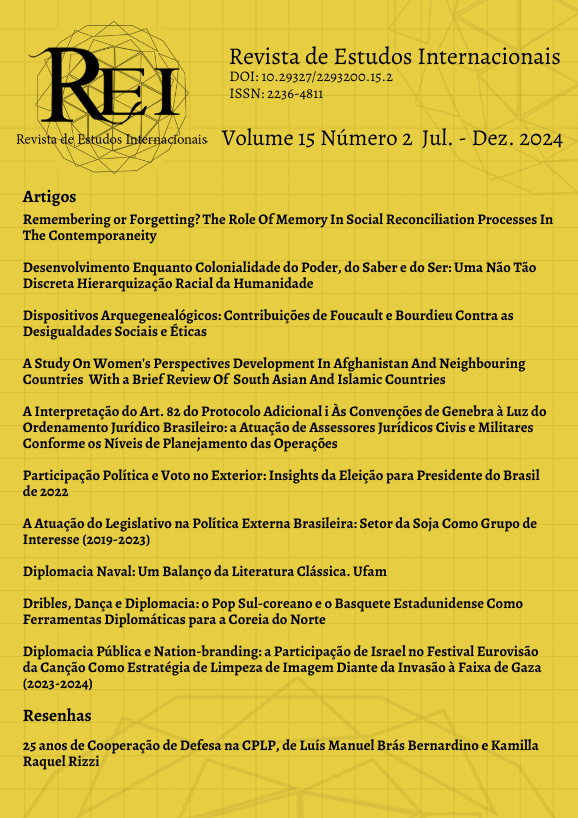REMEMBERING OR FORGETTING? The role of memory in social reconciliation processes in the contemporaneity
DOI:
https://doi.org/10.29327/2293200.15.2-1Resumo
O propósito do presente artigo é analisar o papel da memória em processos de reconciliação social desenvolvidos pela comunidade internacional em cenários de pós conflito intraestatais desde o final dos anos 1990. Diferentes mecanismos de reconciliação social têm sido colocados em prática sem que se questione que memórias estão sendo preservadas, como isso tem ocorrido ou por quê. O argumento central é o de que pressuposições naturalizadas sobre a memória, promovidas pelos agentes interventores, são elaboradas segundo um discurso de ética da memória que com frequência limita as chances de sucesso da reconciliação social entre os que sobreviveram aos conflitos por desconsiderarem as perspectivas, valores e cultura dos sobreviventes e seus impactos sobre como eles percebem a memória, seus modos de preservação e o papel do esquecimento.
Referências
References
ASMAL et al. (1998) Reconciliation Through Truth: A Reckoning of Apartheid's Criminal Governance, ThriftBooks-Phoenix.
AUERBACH, Y. (2004) The Role of Forgiveness in Reconciliation. In: From Conflict Resolution to Reconciliation, ed. By Yaacov Bar Siman – Tov, Oxford University Press, London.
BALL, N. The Challenge of Rebuilding War-Torn Societies. In: CROCKER, Chester. (2001) Turbulent Peace – The Challenges of Managing International Conflicts. Washington: United States Institute of Peace Press.
BAR Tal, D, BENNINK. (2004) The nature of reconciliation as an outcome and as a process. In: From Conflict Resolution to Reconciliation, ed. By Yaacov Bar Siman – Tov, Oxford University Press, London.
BELL, Duncan. (2006) Introduction. In: Memory, Trauma and World Politics, reflections on the relationship between past and present, Palgrave Macmillan, NY.
BLOOMFIELD, David. (2003) Reconciliation: an Introduction. In: Reconciliation after violent conflict, A handbook. Instituto Internacional para democracia e assistência eleitoral, IDEA.
CELERMAJER, Danielle. (2006) The Apology in Australia: Re-covenanting the National Imaginary. In: Taking wrongs seriously, apologies and reconciliation, ed. by Elazar Barkan and Alexander Karn, Stanford University Press.
COHEN, Raymond. (2004) Apology and Reconciliation in International Relations. In: From Conflict Resolution to Reconciliation, ed. by Yaacov Bar Siman – Tov.
FETTE, Julie. (2006) The Apology moment: Vichy memories in 1990s France. In: Taking wrongs seriously, apologies and reconciliation, ed. by Elazar Barkan and Alexander Karn, Stanford University Press.
FIERKE, Karin. (2007) Critical Approaches to International Security, Polity Press, Cambridge.
___________ (2006) Bewitched by the past: social memory, trauma, and international relations. In: Memory, Trauma and World Politics, ed. By Duncan Bell, Palgrave Macmillan, NY.
HAMBER, Brandon. (2003) Healing. In: Reconciliation after violent conflict, A handbook Instituto Internacional para democracia e assistência eleitoral., IDEA.
HAMPSON, F. O.; AALL, P. (eds.). (2001) Turbulent Peace – The Challenges of Managing International Conflicts. Washington: United States Institute of Peace Press, p. 719-736.
HUYSE, Luc Healing. (2003) In: Reconciliation after violent conflict, A handbook Instituto Internacional para democracia e assistência eleitoral, IDEA.
__________(2003) The Process of reconciliation. In: Reconciliation after violent conflict, A handbook Instituto Internacional para democracia e assistência eleitoral., IDEA.
HUYSSEN, Andreas. (2000) Present Pasts: Media, Politics, Amnésia, Public Culture.
LEVY, D. SZNAIDER, N. (2006) Forgive and not Forget: Reconciliation between Forgiveness and Resentment. In: Taking wrongs seriously, apologies and reconciliation, ed. by Elazar Barkan and Alexander Karn, Stanford University Press.
MANI, Rama. (2005) Rebuilding an Inclusive Political Community After the War, in Security and Dialogue.
MARROW, D. (1999) Seeking peace amid memories of war: learning from the Peace Process in Northern Ireland. In: After the Peace: Resistance and Reconciliation, ed. R.L. Rothstein, Lynner Rienner.
MENDELOFF, David. (2004) Truth –seeking, Truth-telling, and Post Conflict Peacebuilding: Curb the enthusiasm? International Studies Review, pp. 355-380 (6).
MIALL, H.; RAMSBOTHAM, O.; WOODHOUSE, T. (1999) Contemporary Conflict Resolution. Cambridge: Polity Press.
ZEHFUSS, Maja. (2007) Wounds of Memory. The politics of war in Germany. Cambridge University Press.
WORLD HEALTH ORGANIZATION - https://apps.who.int/gb/bd/PDF/bd47/EN/constitution-en.pdf?ua=1, acesso em 10 de novembro de 2023.


